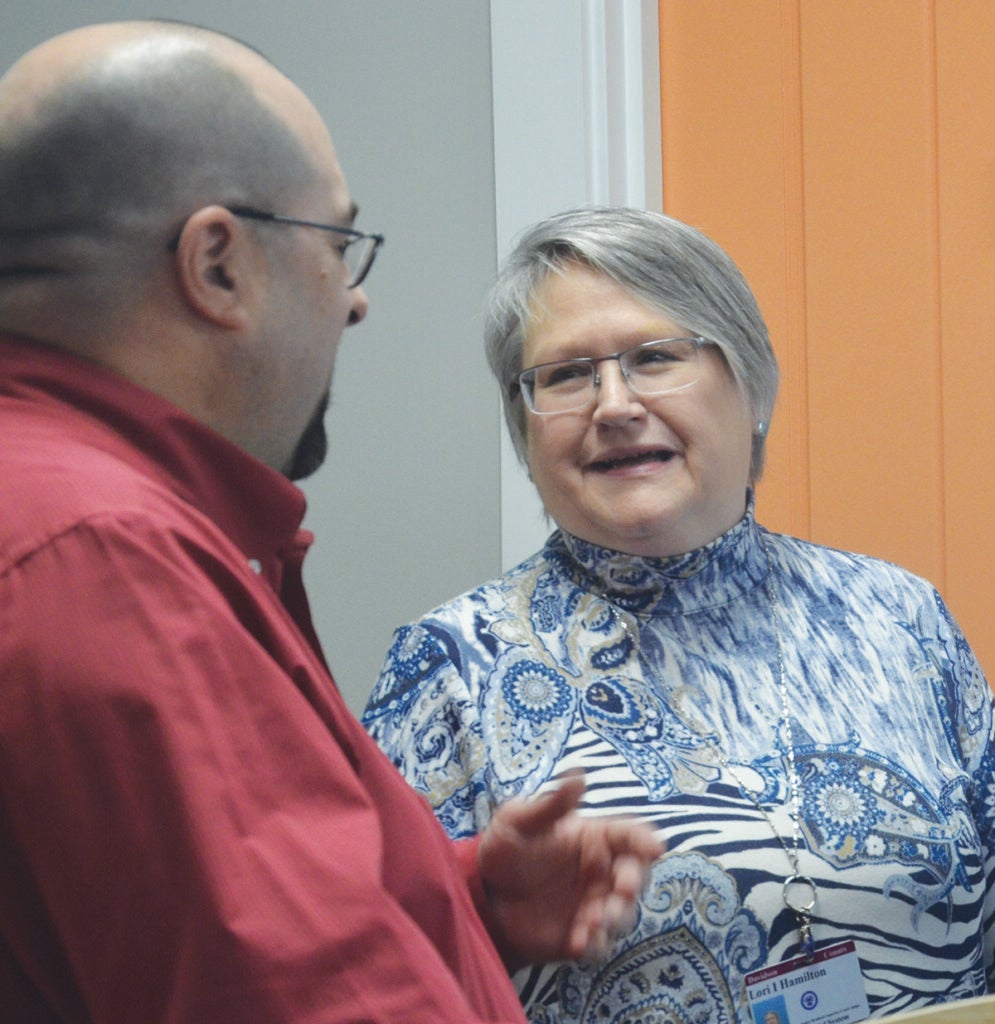Federal funding cut; Dragonfly House looking for new ways to stay afloat
Published 1:56 pm Tuesday, March 26, 2024

- Davie Clerk of Court Jason Lawrence talks with Superior Court Judge Lori Hamilton about The Dragonfly House Children's Advocacy Center. - Photo by Mike Barnhardt
|
Getting your Trinity Audio player ready...
|
By Mike Barnhardt
Enterprise Record
It didn’t take long for Brandi Reagan to realize the real need.
She had helped start The Dragonfly House, a children’s advocacy center in Mocksville, and served as its director when it opened on Oct. 1, 2010. They had expected to see – and help – about 25 children who were being abused.
That first year, 277 abused children walked through the door. The numbers have continued to increase.
And the stories they hear – day after day – aren’t for the faint of heart. Most of the abuse is perpetuated by male family members, and the victims are all ages. Some have been victims for years before their horrors were discovered.
Last week, The Dragonfly House, which serves Davie and Davidson counties, hosted an open house for elected leaders, explaining their work and purpose, and how federal funds to keep it open are dwindling.
In 2018-2019, those federal funds represented 53 percent of the annual budget. Those funds were cut, and this year, a projected 19 percent of the budget will be covered.
Heydy Day, victim services coordinator, conducted one of the tours offered to local and area officials.
The agency, which receives no county or direct state funding, will now be responsible for raising some 30 percent of its budget, up from 18 percent a year ago.
“This affects everybody,” she said. “Going forward, the biggest need will be community funding. We provide a valuable service. It’s obviously needed.”
That service is a one-stop shop so to speak for child abuse victims. Trained staff members talk to the victims, or try to get the victims to talk and become their own voice. In a separate room, the caregiver of the child learns what is happening. That initial interview is being taped, with representatives from stakeholders such as law enforcement (Most of these children are victims of a crime.), the district attorney’s office, medical and mental health professionals watching via video.
“What you hear on the news is only a tiny percentage of what’s going on,” Day said. “We see a minimum of nine children per week.” It has eight full-time and five part-time employees.
Day often conducts that first interview with a child, and all are different. Some feel guilty, some feel like they’re doing something wrong by telling what happened to them, but almost always, they are scared.
“They only have to talk to one person. These crises take away their ability to say yes or no. I try to let them know, ‘You have a voice’.”
Reagan, the executive director, said it’s important the children know the difference between the truth and a lie. It’s a traumatic experience for a child, because most times, it means their family as they know it is being fractured.
“We ask them not to make up answers,” Reagan said. “It’s OK to say, ‘I don’t know’.”
One of the first questions, Day said, is “Do you know why you’re here?”
“If they know and say ‘No’, or just don’t want to talk about it, we know we have a lot more work to do. We never mention a perpetrator’s name. We can’t lead them to people or situations. These interviews have to be sound, because they may be used in court.”
In 2021-22, the Dragonfly House had an 89 percent prosecution rate, and 99.39 percent of the childrens’ caregivers reported that the advocacy center helped not only the child, but them as well.
Those interviews can be as short as 30 minutes, or as long as two hours. And while the victims may be there for a sexual abuse case, often staff finds medical neglection; they have never been to a medical doctor or dentist.
Lydia Nance, a child and family trauma therapist, has a playroom with toys. “Sometimes, they’ll play out their trauma,” she said. Or not. “It is a challenge.”
Bermuda Run Mayor Mike Brannon asked Day what members of the community can do to help. Talk about the issue, and the success rate the Dragonfly House has for helping victims and getting perpetrators arrested. “The more people we advocate, the ripple effects will spread out,” she said. “Just be aware of this and spread the word around.”



